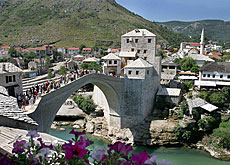Swiss hope to stem Balkan brain drain

Creating better prospects for young people in the Balkans has become a top priority for Swiss aid to the region, say development officials.
The economic situation has become so bad that many youngsters are emigrating abroad which is leading to a brain drain that their war-affected homelands can ill afford.
At the annual conference on Swiss cooperation with eastern Europe, which was held by the Swiss Agency for Cooperation and Development (SDC) and the State Secretariat for Economic Affairs (Seco) in Lausanne last Friday, delegates heard how a high percentage of the younger generation in the Balkans was unemployed.
Many were well educated and trained but simply did not have access to jobs and resources, due to the depressed economic situation – an effect of the interethnic regional war of the 1990s.
“In some countries in the Balkans the percentage of young people who want to emigrate is too high,” SDC director Walter Fust told swissinfo.
“And this is sad because as countries in transition and partly still in reconstruction, they need brains, power and new entrepreneurs.”
Swiss development work for young people in the region is therefore focused on supporting training programmes to help young people into the labour market.
Work experience
In Bosnia the SDC has started a project offering internships and voluntary work in private and state institutions, including international firms such as Siemens and Coca-Cola.
The hope is that young Bosnians – both in the country and abroad – will consider staying in their homeland and thus feed their knowledge back into the economy.
Young people across the Balkans are also benefiting from programmes designed to strengthen local economies, such as being granted easier access to microcredits.
“Aid is important to keep young people at home, as people who are happy at home are not going to leave,” underlined Borka Pavicevic, the director of the Centre for Cultural Decontamination in Belgrade, in neighbouring Serbia, who also attended the conference.
“To be happy at home means you have a chance to show who you are and to become important, to write, to build, to move, and then there will be better circumstances.”
Pavicevic’s art centre also works with young people, giving them the opportunity to organise their first exhibitions or the space to work out their ideas.
“Young people are looking to the future,” she told swissinfo.
But Serbian playwright Biljana Srbljanovic warned that many young people were still feeling “intellectually blocked” from the rest of Europe.

More
Swiss Agency for Development and Cooperation (SDC)
Eastern Europe debate
The conference came just a few weeks before an important vote on aid to eastern Europe, including a SFr1 billion ($800 million) subsidy to the ten new European Union member states.
In her speech to delegates, Foreign Minister Micheline Calmy-Rey emphasised how Swiss cooperation with eastern Europe was also an investment in a stable and safe future in the Balkans. A no-vote would put eastern cooperation in jeopardy, she said.
She added that Switzerland would also benefit, as the effects of any crisis – or easing of the situation – were also felt in the country.
Switzerland is currently home to around 370,000 people from the former Yugoslavia, which makes them the largest foreign population. Most are economic migrants or refugees from the conflict.
Fust pointed out that the eastern European countries which had already joined the EU had transformed themselves quickly and this was having a positive effect on development in the Balkans.
“So it’s a question of supporting the [Balkan] countries on their way, bringing them back to a stable political situation and giving them security,” Fust said.
“And then to develop the economy and the social system in a way that people can stay in the country and help to develop it.”
swissinfo, Isobel Leybold-Johnson in Lausanne

More
Seco
The annual conference on Swiss cooperation with eastern Europe is held every November and provides an insight into SDC and Seco activities in eastern Europe and the former Soviet Union.
This year it was entitled “Young People in the Balkans – A Generation on the Move”.
Switzerland has invested SFr1.5 billion in cooperation with the western Balkans since 1995 and Seco and SDC have carried out more than 1,000 projects in 23 eastern Europe since 1990.
As part of the second set of bilateral treaties with Brussels, non-EU member Switzerland pledged to provide SFr1 billion to ten new EU member states.
Almost half the funds will go to Poland. Hungary will gain SFr131 million, while the Czech Republic will receive SFr110 million.
The Swiss funds will come mainly from cuts in aid programmes run by the foreign and economics ministries.
But the rightwing Swiss People’s Party has forced a vote on the issue which will take place on November 26.

In compliance with the JTI standards
More: SWI swissinfo.ch certified by the Journalism Trust Initiative











You can find an overview of ongoing debates with our journalists here . Please join us!
If you want to start a conversation about a topic raised in this article or want to report factual errors, email us at english@swissinfo.ch.